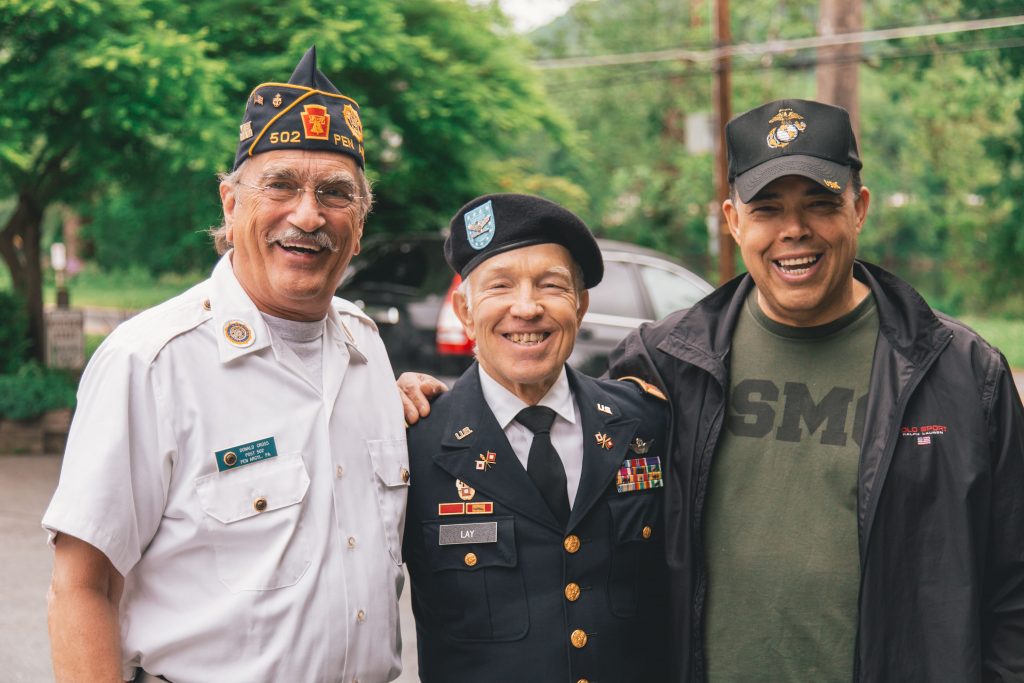- General Veterans’ Benefits
- Disability Compensation
- Pension
- Health Care
- Home Loans
- Insurance
- Burial
- Additional VA Health Benefits for Disabled Senior Veterans
- VA Healthcare for Senior Veterans
- Geriatric Medicine and Long-Term Residential Care
In 2012, there were over twelve million veterans in the United States who were over the age of 65. Today, that number continues to grow. They’ve served in a wide variety of conflicts around the world, from as early as World War II, to as recent as the Persian Gulf War.
For aging uniformed service veterans, the Department of Veterans’ Affairs (VA) offers a range of benefits that can help cover living costs during retirement, healthcare, and other necessities. While most people don’t qualify for every single program, there are many that benefit from a number of them.
General Veterans’ Benefits
There are a surprisingly large number of benefits that, for the most part, are available to most or even all seniors who are veterans. Here’s an overview of what’s available.
Disability Compensation
Many, many people who serve in the military become injured in ways that result in long term disabilities. Fortunately, the VA offers Disability Compensation, a tax-free benefit paid to veterans who develop disabilities during active service as a result of either injury or disease.
This does, in fact, include injuries that do not manifest until after your time of service. The most important requirement is that you qualify as “at least 10% disabled.” A medical examination will be used to rate your disability on a scale of 10 to 100, in increments of 10%. So you don’t need to be very severely disabled to qualify, but it does need to be something that affects your everyday life.
If you also have dependents, you may also receive an additional allowance of 30% or greater of the total you were otherwise awarded.
Other kind of benefits and pay, including military retirement pay, disability separation pay, and others, can sometimes offset disability compensation.
To be eligible, you must meet a certain combination of some of the following requirements:
- Service in the US Uniformed services;
- Active duty for training;
- Inactive duty training (applicable only if the cause of your injury was a heart attack, a stroke, or an injury);
- Discharge under honorable conditions;
- A disability level of at least 10% resulting from injury or disease that was either incurred, or made worse, during active service.
In most cases, you will need medical evidence in order to receive benefits. However, there are a few cases in which a person can be assumed by default to have been disabled in some way. These include:
- People who have been POWs;
- Veterans who acquired certain tropical diseases during service, or during a certain time following their discharge;
- Veterans exposed to radiation, mustard gas, or Lewisite;
- Veterans exposed to herbicides, such as Agent Orange in Vietnam;
- Veterans who served in Southwest Asia (e.g. Arabian Peninsula, Iraq, and nearby regions) during the Gulf War.
Pension
There are two main types of pension for which veteran may be eligible: veterans’ pensions and survivors’ pension.
Veterans’ Pension consists of non-taxable monetary payments available to low-income veterans.
Survivors’ Pension is payable to low-income surviving spouses of deceased veterans who have not remarried, and/or to unmarried children of a deceased veteran.
To be eligible, you must meet a combination of the following requirements:
- Over age 65;
- Permanently disabled;
- Resident in a skilled nursing facility receiving care;
- Receiving Social Security Disability Insurance;
- Receiving Supplemental Security income;
- Yearly household income and/or net worth below a certain threshold.
Health Care
The Veterans’ Health Administration provides healthcare services in over 1,200 hospitals throughout the United States. As of the Affordable Care Act, passed in early 2013, VA healthcare benefits and veterans’ out-of-pocket costs have largely been unaffected.
If you’re already enrolled with the VA, you do not have to take any extra steps regarding coverage standards.
In some cases, VA healthcare benefits can also extend to close family members. This usually only applies if the veteran is severely disabled, or for surviving spouses and children of deceased veterans. In some cases, a child may qualify regardless of the aforementioned criteria if that child has Spina Bifida.
Home Loans
Veterans are eligible for a home loan program, which includes loans provided by private lenders such as banks or mortgage agencies. The VA will guarantee part of the loan, which helps you receive better rates and terms when mortgaging property.
There are a couple of different types of loans that are offered.
- Purchase loans. These are loans that help veterans purchase and mortgage homes with competitive interest rates, generally more favorable than those they’d be able to access on their own. In many cases, you will not need a downpayment, nor will you need private mortgage insurance. Under the “purchase loans” umbrella, there are also cash out refinance loans that can help you leverage your home’s equity to pay off other debts.
- Interest rate reduction refinance loans (IRRRL). This loan helps you refinance an existing VA loan to lower your interest rate.
- Native American Direct Loan Program. These loans are available exclusively to Native American veterans. They can help you build, renovate, or purchase a home on Federal Trust Land. They can also help you further reduce the interest rate on a regular VA loan.
- Adapted Housing Grants. If you have a disability connected to your service, this loan can help you purchase or build an adapted home tailored for accessibility. You can also use this loan to modify your existing loan.
- Additonal state-level resource loans. You may also qualify for additional loans and assistance, managed and awarded on a state level.
Insurance
Veterans are eligible for life insurance policies, which can help you ensure the livelihood of your family at the end of your life. There are several benefits related to life insurance for which you may qualify.
- Servicemembers’ Group Life Insurance. This is a low-interest life insurance policy offered for servicemembers. Your coverage can be extended by up to two years in the event that you are totally disabled at the time you leave service.
- Veterans’ Group Life Insurance. This option allows you to change SGLI into a civilian life insurance program after your seperation from service.
- Family SGLI. This insures your spouse and children if you have SGLI coverage. Children who are still dependent are covered automatically at no charge, but your spouse’s coverage may not exceed your own.
- SGLI Traumatic Injury Protection. This option is included under regular SGLI, and provides additional monetary payments if you have suffered severe injury during service resulting in loss of limbs, blindness, or paralysis.
- Service-Disabled Veterans’ Life Insurance. If you have received a VA rating within the last two years for a disability connected to service, you may be eligible for additonal coverage.
- Veterans’ Mortgage Life Insurance. You are eligible for this if you have been awarded an Adaptive Housing Grant.
Burial
Funerary costs can be very expensive. Fortunately, veterans can often gain access to burial benefits that can help their families cover the costs at the end of their lives. As of 2014, the process has been streamlined and simplified.
There are two types of benefits survivors can receive.
- Service related death. In this case, survivors are awarded up to $2,000 to cover burial expenses, for deaths occurring after September 11, 2001. If the death occurred prior to this, survivors may still be eligible to receive up to $1,500. The cost of transport for the deceased is covered if the veteran is buried in a VA national cemetery.
- Non-service-related death. This option is more likely to apply to retired seniors who are veterans, who have often been out of the service for quite some time. In these cases, survivors may be eligible to receive up to $762 to help cover burial costs.
Here are the requirements your survivors need to meet in order to qualify. They need not meet every single requirement, but must meet certain combinations of them.
- They paid for the funeral or burial of a veteran;
- The costs were not reimbursed by another government agency, or by an employer;
- If discharged, conditions were honorable;
- The veteran died from a service-related disability;
- The veteran was receiving VA compensation;
- The veteran passed away in a VA hospital;
- The veteran had a claim pending at the time of death, for which they were judged eligible;
- The veteran died at a VA-approved retirement home at any time after October 1996.
To receive burial compensation, survivors will need to present proof of death, fill out an application, or work with representative.
Additional VA Health Benefits for Disabled Senior Veterans
Along with all of the benefits discussed above — which can help cover a wide range of costs during the last few decades of one’s life, including life insurance, funeral expenses, and more — senior veterans may also qualify for two other programs available to persons receiving a VA pension benefit.
Aid and Attendance
Aid and Attendance is an increased monthly pension amount available to seniors who meet any one of the following conditions:
- The person needs assistance with activities of daily living (ADLs). This can include dressing oneself, feeding oneself, preparing food, and bathing and other personal hygiene tasks.
- The person is bedridden.
- The person is a patient in a nursing home.
- The patient has very poor eyesight, with visual acuity of 5/200 or less in both eyes, or contraction of the visual field.
Housebound
Housebound is an addition to one’s monthly pension amount that’s available to people who are confined to their home and property as a result of illness, injury, or disability.

VA Healthcare for Senior Veterans
In addition to the healthcare coverage we’ve discussed above, there are a few other additional resources available to veterans over 65. These apply primarily to geriatric medicine and to long-term care.
Geriatric Medicine and Long-Term Residential Care
The Geriatrics and Extended Care Program helps senior veterans cover the cost of long-term care and geriatric medical care. It can help cover a variety of things, including:
- Home and Community Based Services. This covers a range of degrees of assistance and care, from Adult Day Care to skilled nursing care.
- Care in residential settings. This helps cover assisted living costs as well.
- Nursing homes.
- Geriatrics research. Senior veterans may be eligible to participate in geriatric research programs through the Geriatric Research and Education and Clinical Centers (GRECCs), which were first established in the ‘70s to help attract graduate students to geriatric medicine. This can help veterans receive state of the art care, including access to new and experimental treatments for health problems associated with aging.
These options can help you further cover your medical and long-term care costs, and can be combined with other sources of coverage such as Medicare, Medicaid, and Social Security.







